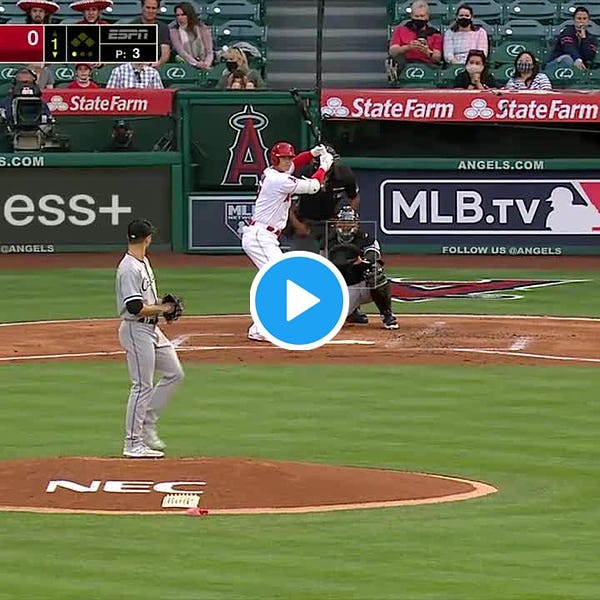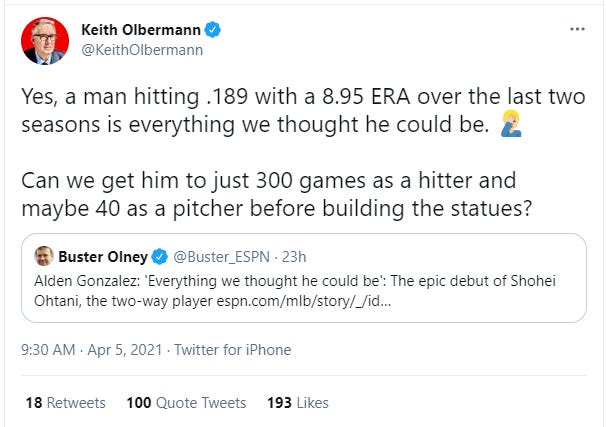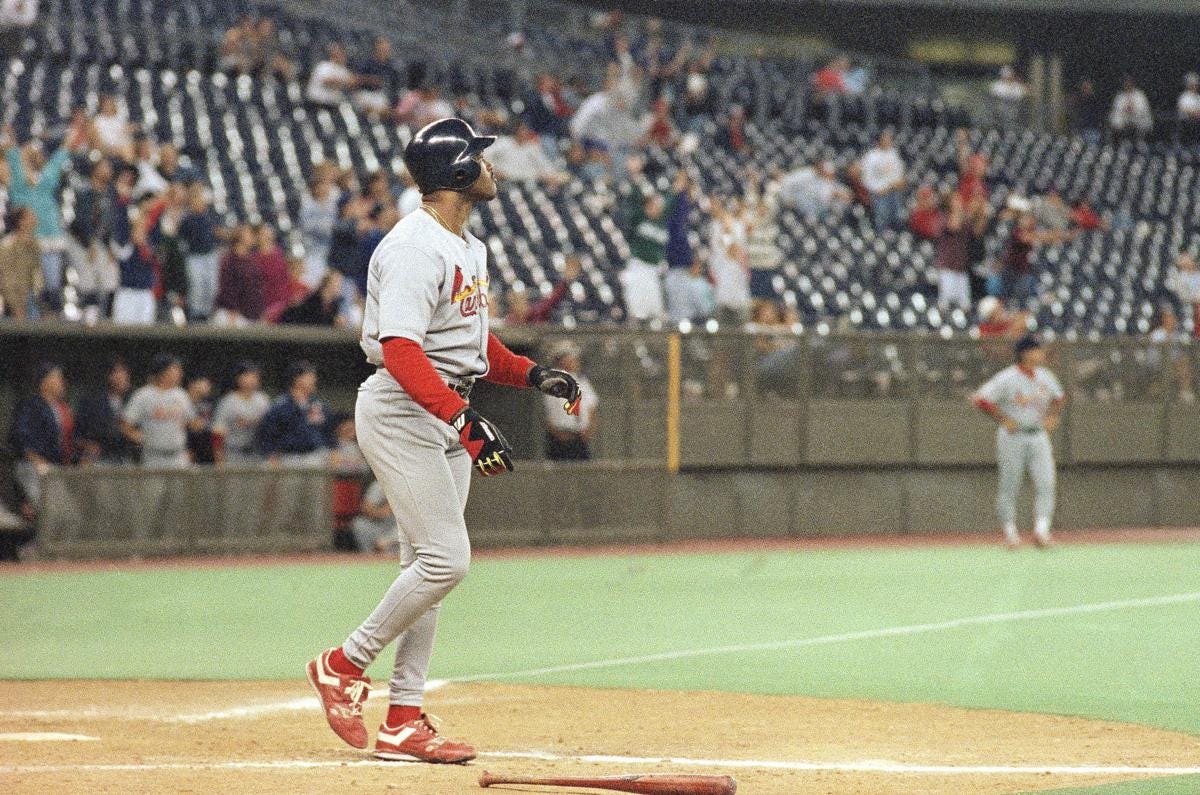I’ve watched the clip a hundred times, and I can’t get over the sound.
On Sunday evening, the Los Angeles Angels played the Chicago White Sox in a nationally-televised broadcast of Sunday Night Baseball. In the bottom of the first inning, Shohei Ohtani, a 26-year-old player beginning his fourth season in Major League Baseball, hit a ball so hard it sounded like a tree being split in half by lightning. It was the sound of a creation myth, the sound of a plane breaking the sound barrier, the sound of a toddler you’ve turned your back on for three seconds hitting their head on a coffee table.
It was the sound of a ball being hit a really long way.
In the top half of that same first inning, Ohtani—still attempting, after several false starts and injury slowdowns, to become the first regular two-way player in Major League Baseball since Babe Ruth, both starting every day as a hitter and pitching in the starting rotation—threw a 100+ mph fastball, the hardest-thrown pitch in the still-young 2021 season. In a single inning, he did the stuff of legends and backyard dreams, the things young boys and girls imagine they’re doing when hurling a foam ball against a garage door, the things that aren’t supposed to be possible for all but a precious few physical marvels.
And of course, some people weren’t satisfied.
That tweet is from Keith Olbermann, a joyless man who parlayed an early career of making funny sounds over baseball highlights into years of strident political speechifying on cable news, and who now apparently does the same thing on YouTube. The numbers in Olbermann’s snarky tweet are misleadingly cherry-picked and his motivations for picking them questionable, but my feelings on the person aside (he sucks), he represents a certain impulse endemic to sports coverage these days, a pathological need to strip away the magic from the games we watch and cast everything into wins, losses, stats and worst of all, being right.
There was a time not too long ago where I lamented the figures in sports who rejected statistics, who cast everything in terms of feel and “I know it when I see it” thinking. Hall of Fame player Joe Morgan was notorious for this sort of thing during his long broadcasting career, often insisting that the numbers on a page couldn’t accurately capture what was happening on the field, instead falling back on eye-tests, conventional wisdom and time-tested aphorisms in defiance of what the math was clearly telling us to be true.
Baseball has swung hard away from this type of thinking in recent years, embracing advanced statistical analysis almost to a fault, the game boiling down to a sterile and at-times-nearly-unwatchable chess match of percentages against percentages. We know more about the game than we ever have, right down to knowing the exit velocity on Ohtani’s home run Sunday night. (115.2 mph, a speed I have experienced in a car exactly once and is just as frighteningly fast for a baseball as it was for a Pontiac Grand Prix.) We know more than we ever have about what kind of play helps win games, and it’s not always moonshot home runs or blazing fastballs.
We know that there are players who do the things that win games—put the ball in play consistently, get on base frequently, etc—and there are players who do the things that win hearts. Sometimes they’re the same. Ken Griffey Jr.’s statistical resume, especially in the first half of his career, more than backs up the superhero status he holds in the minds of a certain late-Gen-X/early-millennial cohort who grew up turning their ballcaps backwards and attempting (with little success) to emulate his butter-smooth swing.
Sometimes, though, athletes write their legends in images and sounds more than numbers and wins.
I distinctly remember watching Mark Whiten play. He was tall, muscular before the peak of the steroid era, and he could hit the ball a damn mile. He played parts of two seasons for Cleveland, my hometown team, when I was just learning to love baseball, watching it in the cavernous and almost-always-empty Municipal Stadium. A season later, after being traded to the St. Louis Cardinals, Whiten hit four home runs in a single game against the Cincinnati Reds, driving in twelve runs—as many as anyone in the century of baseball that preceded that night and in the nearly three decades of baseball that have followed. It was a Paul Bunyanesque feat, the kind that earned a curtain call from opposing fans and forever etched him in my sports memory bank as The Guy Who Did That Amazing Thing (And We Traded Him Away??).
In reality, Whiten was a mediocre player at best—he struck out a lot for the era and didn’t take many walks, hit for a low average and was a defensive liability in right field despite occasionally stunning baserunners who dared test his cannon arm. Over the course of thirteen seasons, he tallied just over 14 WAR (Wins Above Replacement), the handy all-in-one measure of a player’s statistical impact on their team’s success. This would place him barely at the level of a starting player, and hardly in the pantheon of heroes. Much like Joe Morgan, though, I know what I saw.
Shohei Ohtani’s resume is far from complete. He may shrug off his early-career injury woes and become the next Babe Ruth like the Angels surely hoped he would be when they signed him out of Japan’s Nippon Professional Baseball three and a half years ago. Or maybe he won’t, and he’ll continue to tease us with the potential of highlight-reel moments while spending much of the season in the training room, like Bo Jackson did a generation earlier. He might not even reach that level, instead writing a legend in a single game like Mark Whiten did on a Tuesday night in Cincinnati.
In the end, it doesn’t matter.
I lose sight of why I fell in love with sports sometimes. The games can feel cruel and pointless, a zero-sum war between numbers and numbers, between players and owners, between the joy of playing and the vicious reality of business. There are times where it feels like there’s no point to watching, where there’s no magic left anymore.
There was a crowd of around 12,000 fans on hand in Anaheim on Sunday night. Looking back years from now, a young kid in that crowd might not remember much about the game; who won, who lost, the final score or the opposing pitcher. They might not remember how many games the Angels won that season, or know who the most valuable player on the team actually was.
I bet they’ll remember that sound.
—Scott Hines (@actioncookbook)
Is there an athlete you remember as great (perhaps in spite of the concrete reality) based on a single moment or handful of isolated exploits? Tell us!







Before I get to the prompt, I think your premise today is bolstered by the sound the announcer makes when Ohtani connects. He knows _exactly_ what he just saw and he cannot even form a word in English. His first impulse is the laugh of the impossible, a "that did not just happen" moment and I love it.
Shawn Hunwick is 5'7" and 165 pounds. He was a walk-on goaltender at Michigan in part, people think, because his older brother Matt (now with the Sabres), was on the team and you can always use a solid backup goalie, even if he won't play much.
He played three minutes his freshman year, he redshirted his sophomore year (which is somewhat uncommon in hockey) and was on his way to another season of not much action when Bryan Hogan got hurt against Notre Dame. He played 48:49 in relief and made 14 saves for a combined shutout. OK, that happens. Except Michigan proceeded to go on a tear. They won seven straight with "Tiny Jesus" in the net. They won the CCHA tournament and Hunwick was named tournament MVP, the first Michigan goalie to be so honored. They would have been in the Frozen Four in Detroit that year if not for a quick whistle in overtime in Fort Wayne.
By every right, Shawn Hunwick should not have been that good. The next year, he backstopped Michigan to the NCAA title game. His senior year, he was a Hobey Baker Award finalist. At some point, Shawn Hunwick was as good as advertised and better. He got one game in the NHL when the Blue Jackets had a spate of injured goalies and played for 2:33 of a 7-3 win. He's now a player agent. But for two and a half magic years, he was Tiny Jesus.
How you could mention the man without the great nickname??? Hard Hittin' Mark Whiten just flows so nicely.
The guy I'll always remember as awesome, despite the numbers suggesting otherwise, is Herbert Perry. When I was a kid, my parents got us tickets to a game to see beloved Cleveland play the despicable Yankees. On a Saturday in June, we drove up I-71, getting to the ballpark early enough to get some autographs from players around BP and warmups, and I remember this guy being quite nice and seeming impossibly huge up close(of course, I was 10, so that skews the memory).
Anyway, Perry signs the baseball I have, my dad says "hey, watch out for him, he's a new young guy who could be really good," and then in the game, he goes 3 for 4 with not one, but two home runs, and I was convinced he was the greatest, the second coming of Babe Ruth.
[Herbert Perry hit a total of 55 HR in a career that lasted another 9 years, with an overall OPS+ of 96(just a bit below league average) and 5.1 WAR over the course of his time in the bigs.]